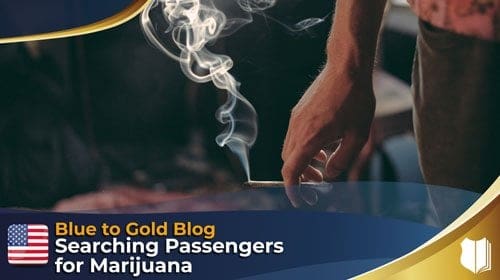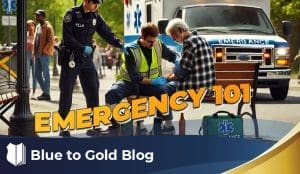Today we are going to answer a question that a lot of you have on your mind. Can you search a vehicle’s passenger for marijuana?
And the answer is: probably. However, I have to go into some legal reasoning here because the answer is really not that clear. There are two key cases I want you to know about before we dive into a little more discussion about the marijuana issue and what the Supreme Court has told us about passengers.
In one case, back in the 1940s, the US Supreme Court said that if you have probable cause for the vehicle, that there’s something in the vehicle, it doesn’t give you an automatic right to search passengers. You have to have a nexus that just makes sense. If you pull over a vehicle, let’s say it’s Uber, and you find drugs on the the Uber driver, certainly that would not give you probable cause in and of itself to search some passenger who does not know that Uber driver.
The other case, happened in the 1970s. And what happened is that the officer gave the driver a citation for speeding, and then did a search incident to arrest. Well, the logic here is that a citation is in lieu of arrest. You may have you heard that before, right? It’s like, “I’m kind of arresting you, but you’re going to be free to go.”
I do hear cops saying this, and they’re kind of taught this way. That’s old school language from some court cases, but quite frankly, I don’t see any value in it.
If you have an arrestable offense, let’s say a suspended license; and your state allows you to arrest somebody for a suspended license, but you’re just going to cite and release them, you get none of the benefits of an arrest. You get no search, you have to be diligent with your time, and so forth. So there’s no value in saying it’s an arrest.
From our perspective of law enforcement, or maybe even academically, it’s, in lieu of arrest. Let the prosecutors enjoy that doctrine, if it gives them anything, but for you, it gives you nothing new. You have an arrest or you don’t. If you don’t have an arrest, it’s treated like a Terry stop, even though you’re citing the person.
Now let’s move into the marijuana discussion. If you have probable cause that a passenger has drugs on them, like marijuana, and you are not intending to arrest them, that’s where the problem comes in. When you do a search of somebody’s person, and it’s not for weapons, that is an arrest. In other words, if you have a passenger with probable cause that they have drugs in their pocket, you go right into the pocket and pull out the drugs.
That type of action is arrest-like, meaning that it needs to be supported by probable cause. And you probably technically arrested them, even though they may not go to jail that day. That is actually not a big deal, the fact that they don’t go to jail. Still, you essentially did a search incident to arrest. That’s the only exception.
We do not have an exception at the Supreme Court level that says if you have probable cause that somebody has evidence on their person; that in and of itself, allows you to search the person. For example, you have probable cause that somebody has drugs in their backpack and they’re walking down the street. Do you have automatic authority to stop the person and search the backpack under some recognized exception to search requirements? The answer is “No!”
So let’s go back to the passenger. If you are going to search the passenger, it’s either going to be an arrest or it’s going to be exigency.
Here’s what I teach my students. Articulate either one if you’re going to search a person’s pockets. You have to have probable cause, right? The driver said something and the passenger said, “Yeah, I’m holding,” and you put your hands in the passenger’s pocket and you pull out a few grams of marijuana. Maybe that’s a site release, but you should articulate exigency, right? Not necessarily an arrest, but exigency.
Do you have time to go get a warrant before getting those drugs out of the person’s pocket? Probably not. By the time you come back, the guy’s going to be gone, or you don’t have the manpower to have somebody sit there and wait with the passenger while you go run to the courthouse. So just articulate exigency.
There is another factor. What if the guy knows that you’re going to go get a warrant, and he has these drugs in his pocket? He could be handcuffed, but he could also probably try to manipulate the drugs, or he could try to take off running. If it’s a paraphernalia pipe, and it’s glass, he could fall on it and break it. So that’s what you should be articulating as exigency for these searches.
Now, on the other hand, if you have probable cause, and you stick your hand in the guy’s pocket, and you pull out crack cocaine and he’s gonna take a ride, well, then argue arrest. because you’re allowed to do a search incident to arrest even if the search comes right before the arrest. And your mindset doesn’t matter, it’s just objective reasonableness. So that’s what’s going on here. It’s probably more complicated than you thought.
Most states do not have cases directly allowing cops to just to go right into the guy’s pocket with probable cause for marijuana and grab it out. The only state that I’ve seen that has this is Colorado. They have a case in point. And it makes it a little easier for those cops to do the job because they can point to a case that tells them they can do it. All those other states don’t have cases in point.
I’m going to reiterate before I end off, if you have probable cause that the passenger has drugs because of your investigation, not just because there are drugs in the vehicle, that means the passengers can be searched.
You have to have the nexus. What would you tell the judge about why you believe the passenger has narcotics? It’s probably not that hard, but you better make that leap first. And then once you have probable cause, articulate one of two things. One, you made the arrest, which would be in the report; or, if you didn’t arrest them, exigency. You had exigency due to the nature of the evidence, and the circumstances of where the stop was and you just didn’t have time to go get a warrant.
Quite frankly, most of the time prosecutors and defense attorneys, especially when they’re not arrested, consider these to be very minor crimes that are simply being pled out. But if you’re asked on the stand, why you did it, I would argue exigency if there was no arrest. I hope I’ve added some clarity to it. It’s still not a very crystal clear subject, but I’m kind of sharing with you what I think the Supreme Court would probably decide.











